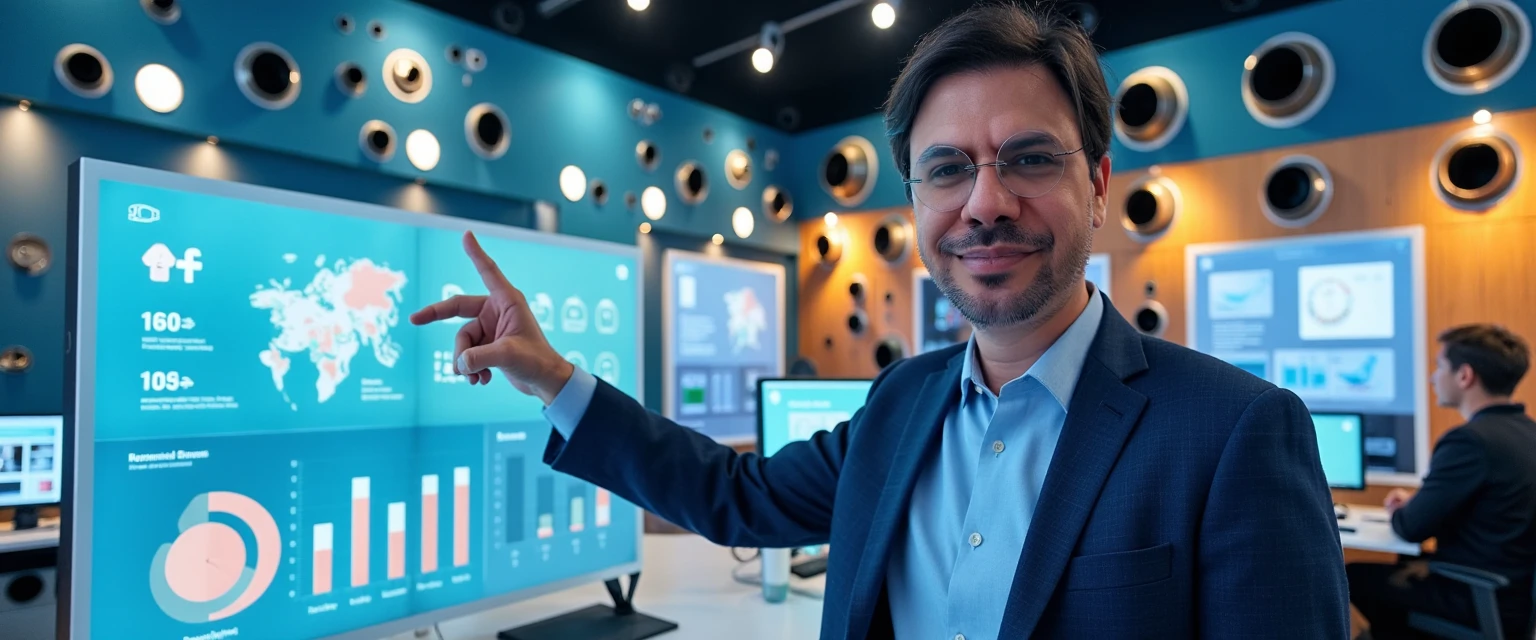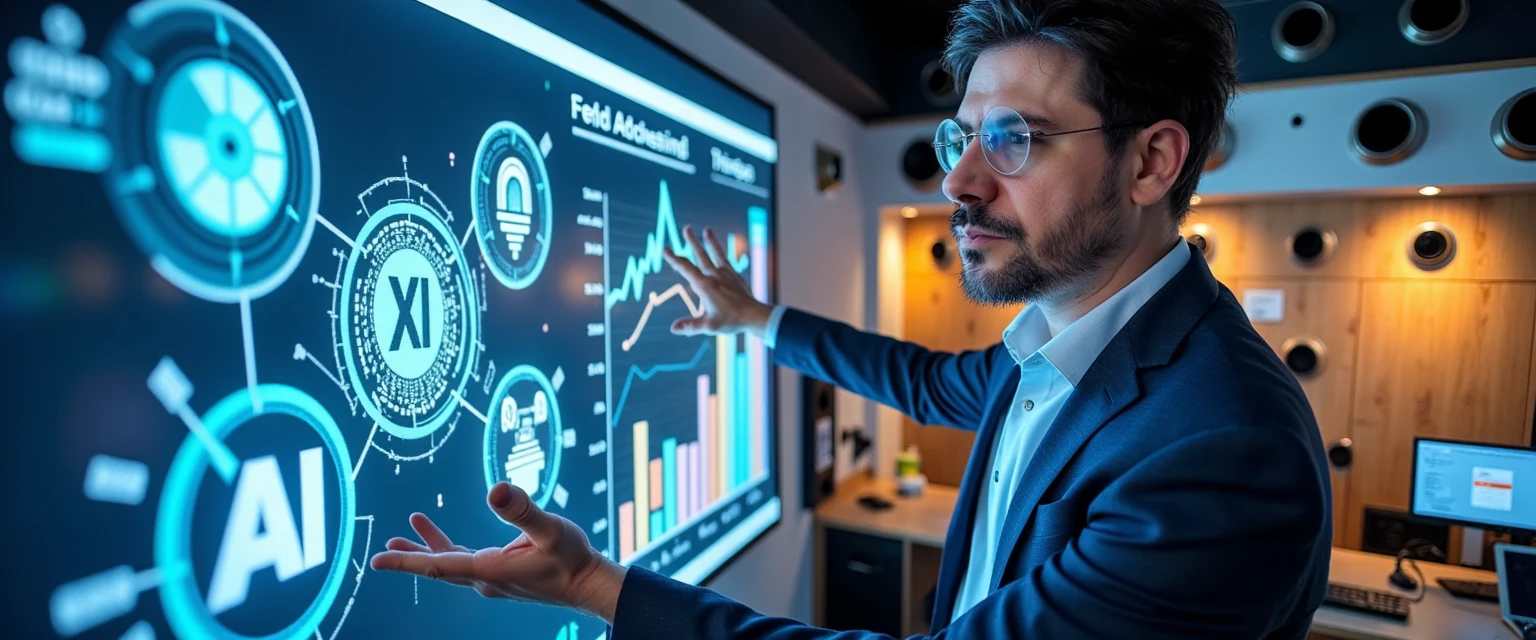AI Radar: From the R$ 90 Million Economy to Collaborative Agents — The Panorama of the Impact of AI on Brazilian Business
April 13, 2025 | by Matos AI

The Economic Impact of AI Gains Strength in Brazil
For some years now, I have been talking about how artificial intelligence would go from being just a promise to becoming a tangible economic reality in Brazil. We no longer need to speculate: the numbers are starting to appear and they are impressive. AI was the dominant theme at the South Summit Brazil 2025, held last week in Porto Alegre, and the cases presented illustrate the moment we are living in.
An emblematic example comes from agriculture: SLC Agrícola managed to save no less than R$ 90 million in the last harvest using AI and computer vision solutions to optimize the application of agricultural pesticides. This is a concrete example of how technology is generating significant results for Brazilian companies, not only reducing costs, but also generating a positive environmental impact by reducing the use of chemicals.
When we analyze the global panorama, McKinsey consultancy points out that AI could generate an addition of up to US$ 13 trillion in the global economy by 2030. Brazil has everything it needs to capture a significant share of this value, but this will depend on how our companies strategically implement these technologies.
Join my WhatsApp groups! Daily updates with the most relevant news in the AI world and a vibrant community!
- AI for Business: focused on business and strategy.
- AI Builders: with a more technical and hands-on approach.
Luiza Trajano and Magazine Luiza: AI as a Protagonist of Transformation
Another case worth highlighting is Magazine Luiza. During the South Summit, Luiza Trajano, the company’s chairman, emphasized the profound transformation that the company is experiencing through AI. According to her, the technology is revolutionizing the customer experience without eliminating jobs — an important counterpoint to the fear of mass replacement.
Magalu is investing heavily in its virtual assistant Lu, Magalu Cloud, and other AI-based initiatives. What strikes me about this case is how the company has managed to make a gradual transition, starting with Lu as a simple avatar years ago, and steadily evolving it into a truly intelligent assistant capable of generating value for the business.
I have observed in my experience with Brazilian companies that this type of incremental and strategic approach tends to generate more sustainable results than attempts to “skip steps” in AI adoption. It is necessary to build solid foundations of data and digital transformation before reaping the most advanced fruits of artificial intelligence.
A2A: Google Introduces Protocol That Could Revolutionize Interoperability Between AIs
One of the most relevant news stories of the last 24 hours was Google’s announcement of Agent2Agent (A2A), a new open protocol to facilitate communication between different artificial intelligence agents. This is a strategic move that could have profound implications for the entire AI ecosystem.
According to information provided by Hardware.com.br, A2A aims to end the fragmentation of AI tools, models and systems that operate in isolation, especially in corporate environments.
This initiative reminds me of an analogy with the internet: just as HTTP and TCP/IP protocols allowed the web to become an interconnected ecosystem, A2A could be the first step towards an interoperable AI ecosystem. A digital nervous system where different AI agents will be able to collaborate with each other, even if they come from different platforms or vendors.
For Brazilian companies, this means that investments in specific AI solutions can be better protected in the future, without the risk of being isolated in technological silos. The stable version of A2A is planned for late 2025, but organizations that want to stay ahead of the curve should start thinking about how this interoperability can benefit their business.
AI in Medicine: Revolution in Brazilian Oncology
Artificial intelligence is transforming Brazilian medicine, with an emphasis on oncology. According to a report published in O Globo, advances in machine learning and deep learning are enabling faster diagnoses and personalized treatments.
What I find most promising in this area is AI’s ability to analyze large volumes of data to identify patterns that would be impossible for human doctors to detect. In a country with continental dimensions like Brazil, where we have a severe shortage of specialists in many regions, AI can be a democratizing factor in access to accurate diagnoses.
However, challenges such as data quality and the need for adequate infrastructure persist. In my experience working with healthtech startups, I see that sector regulation can also be both a brake and an accelerator of this process, depending on how it is implemented.
Beyond Google: Diversifying Search Engines with AI
An interesting trend I’ve been observing is the proliferation of AI-powered alternatives to Google for web searches. TechTudo highlighted five tools that are gaining ground: Perplexity, Arc Search, ChatGPT Deep Research, Gemini Deep Research and iAsk.
What strikes me as most relevant about this trend is how these tools are redefining the very nature of internet search. It’s not just about finding relevant links, but about synthesizing information, cross-referencing sources, and presenting structured conclusions. It’s a paradigm shift that will profoundly alter how we consume information online.
For Brazilian entrepreneurs, this represents both a challenge and an opportunity. On the one hand, optimizing online presence for these new search interfaces will be essential. On the other hand, there is room for local solutions that understand the nuances of Brazilian Portuguese and the specificities of our market.
AI in Proximity Retail: The Power of Technology in Neighborhood Commerce
One of the most interesting applications of AI that I see is in proximity retail. According to research by Yalo reported by Estado de Minas, 62.5% of the sales potential in the sector is not used, and AI can be an ally to increase the average ticket by up to 15%.
This data seems especially relevant in the Brazilian context, where neighborhood commerce represents not only a significant economic force, but also a cultural and social element of our cities. Technology can help personalize the customer experience, optimize inventory and improve communication between brands and retailers.
A critical point revealed by the research is that 20% to 25% of neighborhood stores do not receive commercial visits, causing significant losses. The implementation of AI can help democratize access to management and marketing tools that were previously exclusive to large chains.
The 50 Most Promising AI Companies in the World
Forbes' annual AI 50 list, as reported by Forbes Brazil, highlights the world’s most promising privately held artificial intelligence companies. Among them are Anysphere and unicorn OpenEvidence, which illustrate how startups are focusing on developing AI in a variety of areas.
What strikes me about this list is the absence of Brazilian companies. This does not mean that we do not have promising AI startups here — I have followed several of them in my work as a mentor and investor. However, it reflects the need for greater internationalization of our startups and a more robust ecosystem to support them.
The list also highlights the importance of access to infrastructure to meet the growing demand for computing power. This is a critical point for Brazil: we need not only AI talent, but also affordable computing infrastructure so that we can compete globally.
Security and Privacy: What Never to Share with an AI
A growing concern I have seen is around security and privacy when using AI tools. Correio Braziliense highlighted that OpenAI warns that the information entered could be used to train models, raising important privacy concerns.
It’s crucial for users to understand that interactions with AI chatbots are not private conversations. Sensitive information such as logins, passwords, personal or financial data should never be shared with these tools. This is a mindset shift: we need to develop new digital security instincts for this era of ubiquitous AI.
For companies, this also means developing clear policies on how their employees can use AI tools, especially when it involves sensitive corporate data or customer information. In my consulting work, I have recommended creating specific guidelines for the use of generative AI within organizations.
The Transformation of the Chip Market by AI
According to a report by Terra, the demands for artificial intelligence have profoundly transformed the computing chip market, especially with the use of GPUs. Companies are creating supercomputers with up to 100,000 chips, and the need for energy is growing.
This is a transformation that goes far beyond technology, affecting geopolitics, the global economy and sustainability. For Brazil, it represents both a challenge and an opportunity: on the one hand, our dependence on imported hardware is increasing; on the other, we have privileged conditions for generating clean energy that can power data centers.
The development of data centers dedicated to AI is attracting massive investments, which could exceed US$1.4 billion by 2028. I believe that Brazil can and should position itself strategically in this market, taking advantage of our competitive advantages in renewable energy and international connectivity.
AI in Real Estate: From Prospecting to Selling
An interesting AI use case that has emerged recently comes from the real estate market. According to Estadão, Tecnisa, a Brazilian real estate developer, has already sold two apartments with direct help from its AI system called Isa, which identifies customers most likely to purchase properties.
This example illustrates how AI is evolving from a simple analysis tool to a system that effectively contributes to business results. Tecnisa was able to optimize its sales process by using AI to predict purchasing behaviors and direct sales efforts more efficiently.
In the Brazilian real estate sector, which is traditionally conservative in terms of technology, this adoption represents a significant change. I have been following several proptechs (real estate startups) that are developing similar solutions, which suggests a broader transformation on the horizon.
Conclusion: Brazil at the AI Crossroads
Analyzing the news from the last 24 hours, it is clear that AI is generating concrete economic impacts in Brazil, from agriculture to retail, real estate and healthcare. We are no longer in the realm of promises or possibilities: we are seeing measurable financial results.
At the same time, innovations such as Google’s A2A protocol and the evolution of AI-based search tools show that the technology ecosystem continues to transform rapidly. For Brazilian companies, this means that adopting AI is not a project with a beginning, middle and end, but a continuous process of adaptation and evolution.
The challenge for Brazil is not simply to adopt AI technologies, but to do so in a strategic, sustainable and inclusive way. We need to build local capabilities, develop talent and create a regulatory environment that fosters innovation without compromising values such as privacy and security.
In my work mentoring startups and consulting with established companies, I have emphasized the importance of a holistic approach to AI adoption that considers not just the technology itself, but also people, processes, and purpose. Organizations that can integrate these elements will have a better chance of capturing the value that AI can deliver.
This is a time for caution and at the same time for boldness: caution to avoid falling for empty promises or superficial implementations; boldness to reimagine businesses and processes by taking advantage of the full potential that AI offers. Brazil has all the conditions to be a protagonist in this journey, but this will require vision, investment and collaboration between different actors in the ecosystem.
I’ll continue to closely monitor this evolution and share insights here on the blog. If you’d like to discuss how your company or startup can strategically benefit from AI, get in touch – in my mentoring and consulting work, I’ve helped organizations navigate this complex but opportunity-rich territory.
✨Did you like it? You can sign up to receive 10K Digital's newsletters in your email, curated by me, with the best content about AI and business.
➡️ Join the 10K Community here
RELATED POSTS
View all



